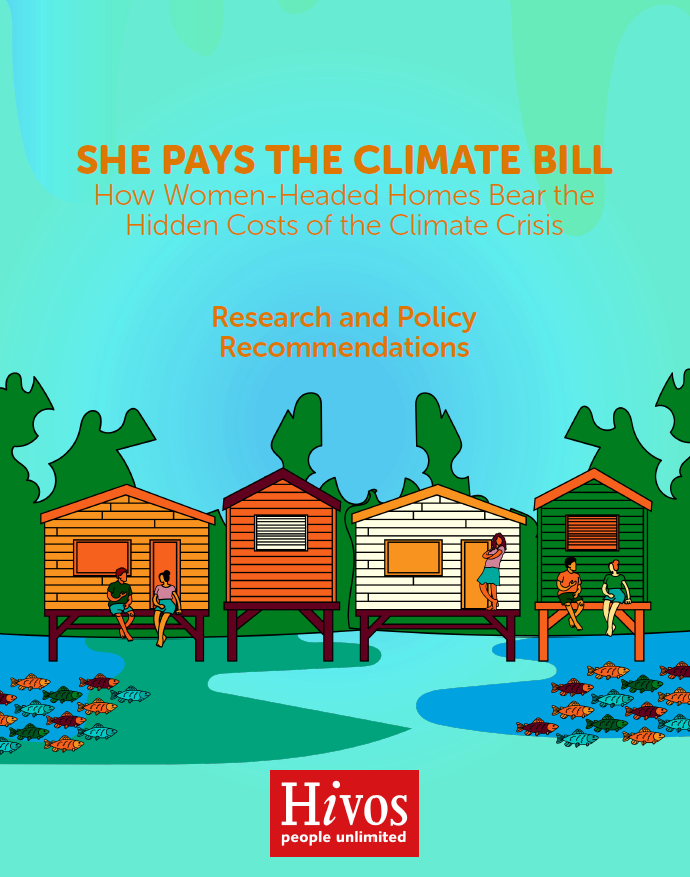How women-headed homes bear the hidden costs of the climate crisis
New research reveals a systemic and invisible injustice: women and low-income families across the Global South are paying the real costs of the climate crisis; not governments, and not the corporations most responsible for emissions.
Hivos and local partners in Brazil and Zambia conducted mixed-methods research with 236 households to better understand how climate change is reshaping daily life, budgets, emotional wellbeing, and survival strategies. The findings expose a profound economic and gendered reality: climate impacts are landing directly inside homes, and women are absorbing the costs through unpaid care, rising expenses, lost income and recurrent debt.
This is the “hidden climate bill”: an uncounted subsidy being paid from women’s bodies, time, and unpaid labor.

Key findings:
- Households in Zambia spend 10–30% of annual income recovering from climate shocks.
- Women in Brazil’s informal economy lose up to 40% of monthly income during extreme weather events.
- 58% of households skip meals after climate shocks, and families often fall into debt to cope.
- These costs are absent from national climate planning, budgeting, and global climate finance systems.
Women’s unpaid labor and household costs are rising
Extreme weather events are forcing women to rebuild homes, secure food, care for children and elders, and adapt without institutional support. They are changing daily routines, absorbing shocks with their own resources, and carrying the mental and emotional load of uncertainty.
Existing climate and economic structures reinforce power imbalances
Those least responsible for climate change (women, informal workers, rural families, young women and girls) are those paying most for adaptation and survival. Meanwhile, fossil fuel corporations continue to profit, and public budgets are insufficient to address the scale of household-level losses.
Current climate finance systems are inadequate for frontline realities
Most climate finance remains locked in mitigation, large institutions, and slow bureaucracies. Household spending is invisible in public budgets and in global negotiation frameworks. Women are already doing the work of adaptation, but without resources, recognition, or decision-making power.
In light of these findings, we put forward the following recommendations to ensure that the climate bill is no longer paid by the most marginalized and economically vulnerable communities.
For national governments
- Adopt Climate Bills frameworks to identify, track, and reassign household-level climate costs.
- Integrate gender-responsive budgeting into climate finance architecture and national adaptation plans.
- Redirect fossil fuel subsidies toward resilience, care systems, and community-led adaptation.
- Allocate funding directly to grassroots and women-led initiatives through simplified and rapid-access mechanisms.
- Establish mandatory systems for public reporting on household-level losses, costs, and adaptation needs.
For International Climate Finance Institutions
- Recognize household spending on climate adaptation as a core indicator of unmet needs — and include it as a criterion for climate finance allocation, not only process-based metrics linked to the Global Goal on Adaptation.
- Expand and simplify direct access windows for women-led, community-based, and local organizations.
- Reform governance of the Green Climate Fund and similar mechanisms to ensure meaningful participation of grassroots movements and frontline communities.
- Support debt cancellation, partial restructurings, and innovative blended finance models tied to inclusive, justice-centered climate investments aligned with Climate Bills.
This COP must be the turning point
As world leaders gather in Belém, one of the most climate-exposed regions of the planet, the reality is already unfolding far beyond negotiation halls. Women are paying this crisis in hunger, debt, unpaid care, exhausted bodies, and futures delayed, while families rebuild their lives again and again. The true cost of climate inaction is not measured in global indicators, curves, or carbon targets, but in the everyday survival sacrifices happening inside homes.
COP30 must be the turning point: where governments stop outsourcing the consequences of the climate crisis onto women and low-income households — and start holding those most responsible to account. Finally, Climate Bills are not only a policy innovation; they are a justice obligation. The transition must be fast, fair, and funded, and no woman should ever have to pay for the climate crisis with her labor or her children’s future. If climate finance does not reach women and families, then climate action has failed.
So we ask again: Who Pays the Climate Bills?

